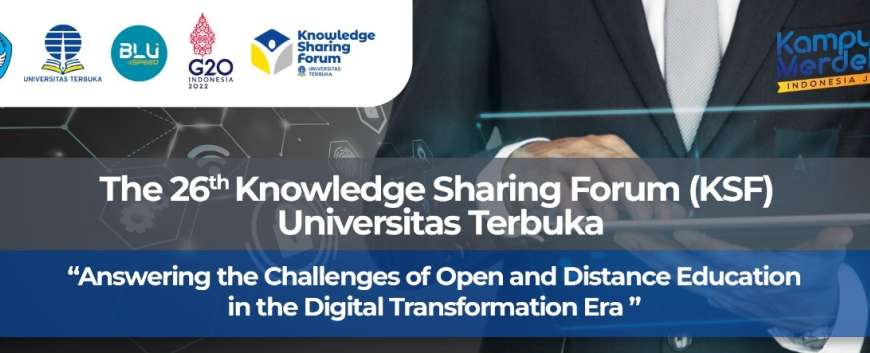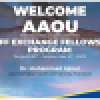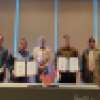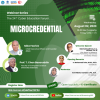- Posted by Khafi Mubegi
- 18 Aug 2022
- INTERNASIONAL
- Total View 0
The 26th KSF: Answering the Challenges of Open and Distance Education in the Digital Transformation Era
The Industrial Revolution 4.0 has created disruption in various aspects of life, and education is not an exception. The main characteristics of education in this era is the use of technology in teaching and learning activities or often referred to as cyber system. This phenomenon has shifted the learning process which was previously conducted on face-to-face methods of teachers and students, and now it is done online. It has been practiced massively in so many universities around the world.
As the pioneer of open and distance higher education in Indonesia, Universitas Terbuka (UT) has always been active to promote open and distance learning system. One form of such UT’s activities is the convention of Knowledge Sharing Forum (KSF) which has entered its 26th episode which brings up the theme on “Answering the Challenges of Open and Distance Education in the Digital Transformation Era”. Being held on Thursday (18/08/2022) online through Zoom and broadcast live on YouTube UT TV channel with the registered participants of more than 300 people who consist of lecturers, teachers, educators, university students, and people in general, both local and foreign participants.
The 26th KSF presented two resourceful presenters, namely Dr. Renah Wolzinger, the Chief Learning Officer at EON Reality, and Prof. Dr. Richardus Eko Indrajid, the Rector of Pradita University.

The program was opened by the remarks from UT’s Rector who was in this opportunity represented by the UT’s Vice Rector for Institutional Development and Partnership, Rahmat Budiman, M.Hum., Ph.D. In his address, he said that the education sector is the sector which has been adaptive to the very rapid digital transformation with the Covid-19 pandemic. Accordingly, UT has now also transformed into a cyber university. With such transformation, UT endeavors to give education access to the people as extensive as possible.

The first resourceful person, Dr. Renah Wolzinger, illustrated the use of Virtual Reality (VR) and Extended Reality (XR) in learning and teaching activities. He stated that the instructors or teachers and students will face difficulty in conducting learning and transfer of knowledge online. Therefore, there must be some solutions to deal with the issue. It would be more convenient and interesting if it utilizes VR technology and XR technology. The students get benefits from various features available in VR and XR, such as the simulation that can be one repeatedly and allow the instructors or teachers and students to share their sources of learning at ease. Additionally, this technology has also been able to cope with the issues on learning online which was previously feared to cause loneliness during learning activities. With VR and XR technologies, the students can interact with their fellow students in one digital environment.
The next illustration was presented by the second resourceful person, Prof. Dr. Richardus Eko Indrajid, on “Visioning Distance Education in the Future: How information technology will shape the higher-education ecosystem”. He conveyed that the pandemic has accelerated the development of technology. Now, the learning process is facilitated by the information technology by improving the performance in university. Additionally, campus has become the center of connection and governance of all kinds of connections, modes, and networks distributed across the archipelago wherever the students are located. Therefore, it is important for all universities to facilitate the learning process for their students. University must have four significant values to become a good and credible university: (1) reachness and richness, (2) network and resources, (3) quality and performance, and (4) values and benefits.
After the presentation of both speakers, the sequence of the event continued with question-and-answer session which was responded enthusiastically by the participants. This session concluded the 26th Knowledge Sharing Forum today.






